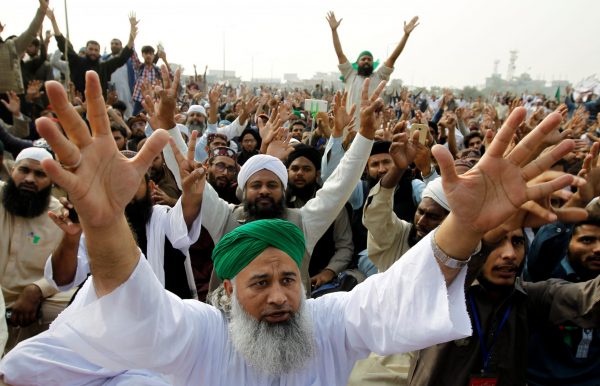A silver lining to this political chaos was a relative decline in incidents and casualties of violence and terrorism throughout the country after the conclusion in February of Operation Zarb e Azb and the subsequent initiation of Operation Radd ul Fassad. But with the imminent rise of ultra-right groups coupled with back-to-back terror attacks in the country’s northwest, the year is not ending on a positive note for Pakistan.
The DAWN Leaks saga in 2016 set the foundation for things to come in 2017 by denting the trust in civil–military relations during the first three years of Nawaz Sharif’s tenure. On October 2016, DAWN — Pakistan’s leading English daily — published an expose that revealed the minutes of a confidential meeting between civil and military leaders. It reported how the Nawaz-led Pakistan Muslim League (PML-N) government had chided the military for interfering in government-led actions against insurgent groups and had asked for measures to be taken against insurgent groups that had been tacitly supported by the military.
What became clear was that there would be no interference from the military if law enforcement agencies went after groups that were deemed ‘previously off limits’ by Pakistani military intelligence.
The leaks did not sit well with the military and resulted in the sacking of then information minister Pervez Rasheed — the prime suspect in leaking the story. Even though the matter was later resolved ‘amicably’, one cannot ignore the fact that the military’s ego was bruised during the course of events. These tensions coincided with the noose tightening around Sharif and his family, who were at the time embroiled in the Panama papers controversy.
On 28 July 2017, Sharif was finally disqualified and forced to resign — a decision which prompted investigation into Sharif and his family’s assets by Pakistani accountability courts. Sharif’s disqualification resulted not from the Panama papers but from additional proof submitted by a joint investigation team that was formed by the Supreme Court to probe Sharif and his family’s assets. The six-member team consisted of two members from military intelligence agencies, whose inclusion was later questioned by the ruling party.
As a consequence of Sharif’s removal, his National Assembly seat was vacated and by-polls were held in his NA-120 constituency of Lahore. Kulsoom Nawaz (Sharif’s wife) successfully reclaimed the seat for her husband’s ruling party, but two ultra-right groups — the Milli Muslim League (an offshoot of Lashkar e Taiba) and Tehrik e Labaik Pakistan (TLP) — combined claimed 11 per cent of the vote in the urban territory. This raised serious questions about Pakistan’s counter-extremism efforts.
TLP is an ultra-right movement led by Khadim Hussain Rizvi — a firebrand cleric who supports blasphemy-killer Mumtaz Qadri. Though many Pakistanis thought the TLP might merely operate as another religio-political party, little did they know that the TLP would soon bring the country’s capital to a standstill, incite violence and force a sitting minister to resign.
In November 2017, Cleric Rizvi, along with some 2500 of his supporters, organised a sit-in in Rawalpindi — Islamabad’s twin city — over a proposed constitutional amendment to change the phrase ‘I … solemnly swear’ with ‘I … hereby declare’ in electoral and constitutional declarations.
The state took action against the protest on 25 November 2017 and conducted a botched operation which resulted in the death of a policeman and injured more than 100 people. Soon after, the military was called in to restore order but rather than attempting to disperse the sit-in, the military chief opted to negotiate with the protesters, which resulted in a deal between the TLP and the government. The TLP’s demands were accepted — the sit-in was called off, the law minister resigned and all arrested TLP members were released escaping further punishment.
Adding to the ruling government’s embarrassment, Cleric Rizvi revealed that his group only held talks with the army and that the civilian government had no role in the negotiations. This raised questions about not only the government’s competence but also the military’s unconstitutional role in negotiating a purely political deal.
So for many, the capitulation by PML-N had not only weakened the civilian government as well as proliferated hate speech and the narratives of the ultra-right but also set a precedent for future protests by similar religious groups. DAWN’s editorial rightly summed up the deal as a time when Pakistan surrendered ‘its authority to a mob that threatened to engulf the country in flames’.
Until the end of October, many believed that 2017 would be remembered as the year Nawaz Sharif was ousted on charges of corruption. But developments in Lahore by-polls and the TLP’s Islamabad sit-in provided a spark to the tinderbox of religious fanaticism and intolerance in Pakistan. With general elections around the corner in 2018, Pakistan is entering 2018 with a weak democracy, a strong military and a rejuvenated religious ultra-right.
Farooq Yousaf is a doctoral candidate at the University of Newcastle.
This article is part of an EAF special feature series on 2017 in review and the year ahead.


A fascinating read – summarises recent events and describes the political mood in Pakistan exceptionally well.